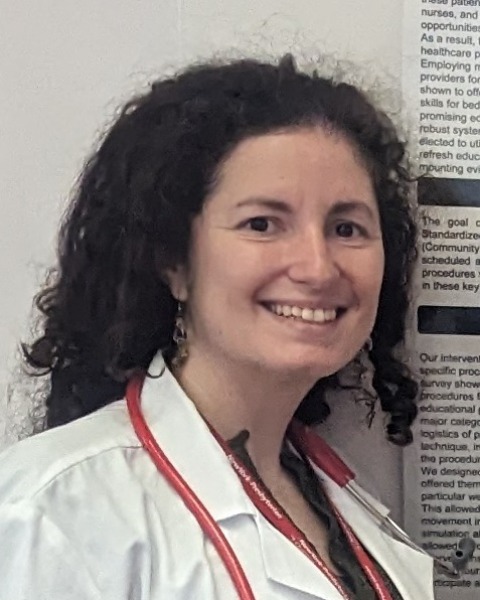Neonatology
Session: Neonatal/Infant Resuscitation Works in Progress
WIP 56 - Community Hospital Standardized Procedural Refresher for the Interprofessional NICU Team (SPRINT)
Monday, May 6, 2024
9:30 AM - 11:30 AM ET
Poster Number: WIP 56
Publication Number: WIP 56.2648
Publication Number: WIP 56.2648

Natasha Shapiro, MD (she/her/hers)
Simulation Education Fellow; Neonatologist
NewYork-Presbyterian/Queens
Rego Park, New York, United States
WIP Presenting Author(s)
Background: Life-saving procedures are often performed on critically ill newborns in the neonatal intensive care unit (NICU). However, in our experience, these high-yield, low-frequency procedures are rare at community hospitals. The comfort level and confidence of performing these necessary skills can therefore be low. Healthcare providers may not have consistent and regular opportunities to utilize their expertise due to a lack of clinical opportunity. As a result, there is a decay in the knowledge and confidence when performing and assisting with these procedures. Employing medical simulation has been shown to offer improvement of health care professionals' knowledge and skills for bedside procedures and resuscitations. Simulation is a promising educational tool for establishing high-quality, safe, reliable, and robust systems to improve patient safety and patient outcomes. We elected to utilize simulation-based educational sessions to reinforce and refresh education for health care providers in our NICU.
Objective: The goal of this pilot research study, Community Hospital Standardized Procedural Refresher for the Interprofessional NICU Team (Community Hospital SPRINT), is to evaluate if providing a regularly scheduled skills refresher in rarely used, high acuity NICU procedures will improve provider and nursing proficiency and confidence in these key skills.
Design/Methods: Our educational design started with an anonymous pre-test to assess the providers' baseline knowledge and comfort level with the procedure. Staff then participated in an in-situ simulation, were evaluated with a team-based checklist, and concluded with a short debrief. Participants then received skill-specific education. Post-intervention, they participated in a second simulation case, again evaluated with a team-based checklist, and concluded with another short debrief. The participants then completed an anonymous post-test and comfort survey at the end, and a follow-up survey, 90 days later, to assess the efficacy of the educational program. This study protocol qualified for exempt status by the NYPQ IRB.
